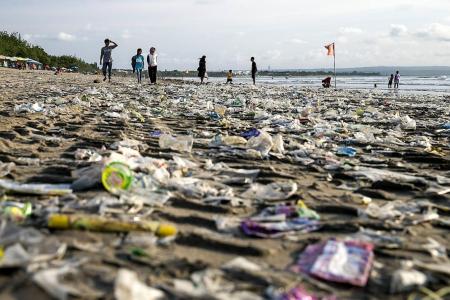Bali beaches turn into seas of garbage
KUTA Bali's palm-fringed Kuta beach has long been a favourite with tourists seeking sun and surf, but nowadays its golden shoreline is disappearing under a mountain of garbage.
Plastic straws and food packaging are strewn between sunbathers, while surfers dodge waste flushed out from rivers.
"When I want to swim, it is not really nice. I see a lot of garbage here every time," Austrian traveller Vanessa Moonshine said. "It is always coming from the ocean. It is really horrible."
The Indonesian holiday island has become an embarrassing poster child for the country's trash problem.
Indonesia is the world's second biggest contributor to marine debris after China.
The problem has grown so bad that officials in Bali last month declared a "garbage emergency" across a 6km stretch of coast that included popular beaches Jimbaran, Kuta and Seminyak.
Officials deployed 700 cleaners to remove roughly 90 tonnes of debris each day to a nearby landfill.
"People with green uniform were collecting the garbage to move it away, but the next day I saw the same situation," said German Claus Dignas.
Some 72km from Kuta, Mount Agung has been threatening to erupt for two months, prompting tourists to cancel visits and displacing tens of thousands of villagers living within a 10km radius of the volcano's crater.
But the island's waste problem is no less of a threat, said Mr I Gede Hendrawan, an environmental oceanography researcher from Bali's Udayana University.
"Garbage is aesthetically disturbing to tourists, but the plastic waste issue is way more serious," he told AFP.
HEALTH PROBLEMS
"Microplastics can contaminate fish, which, if eaten by humans, could cause health problems including cancer."
Indonesia is one of nearly 40 countries that are part of United Nations Environment's Clean Seas campaign, which aims to halt the tide of plastic trash polluting the oceans.
As part of its commitment, the government has pledged to reduce marine plastic waste by 70 per cent by 2025.
It plans to boost recycling services, curb the use of plastic bags, launch clean-up campaigns and raise public awareness. - AFP
Get The New Paper on your phone with the free TNP app. Download from the Apple App Store or Google Play Store now



